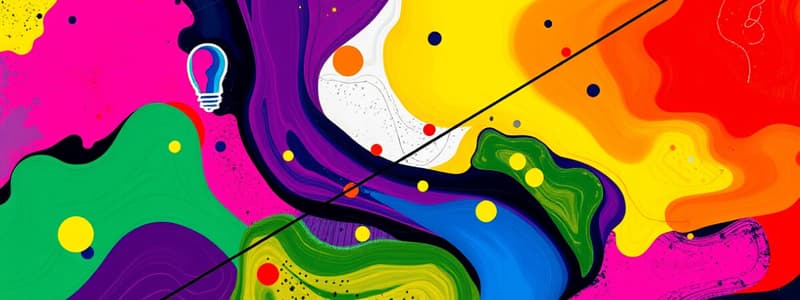Podcast
Questions and Answers
Which of the following statements about correlations is NOT correct? (Select all that apply)
Which of the following statements about correlations is NOT correct? (Select all that apply)
- The further away from -1 that a negative correlation lies, the weaker the correlation.
- The further away from 1 that a positive correlation lies, the weaker the correlation.
- All options are correct. (correct)
- A correlation of -0.7 has the same strength as a correlation of 0.7.
Which of the following statements is an example of a positive correlation?
Which of the following statements is an example of a positive correlation?
- There is no known relationship between reading and alcoholism.
- The more hours you study, the better your performance on your exam. (correct)
- The more hours in a day you stay awake, the less hours you spend asleep.
- None of the statements is an example of a positive correlation.
Which statement is NOT true about positive correlations?
Which statement is NOT true about positive correlations?
- As one variable increases, so does the other one.
- None of the options are true.
- A positive correlation is an indication that one variable causes the other one. (correct)
- A correlation of 1 indicates a perfect positive relationship.
What is a correlation?
What is a correlation?
Every correlation has which two qualities?
Every correlation has which two qualities?
Flashcards are hidden until you start studying
Study Notes
Correlation Concepts
- Correlation measures the relationship between two variables, indicating how they change together.
- A correlation value ranges from -1 to 1, where:
- -1 represents a perfect negative correlation.
- 1 represents a perfect positive correlation.
- 0 indicates no correlation.
Types of Correlation
- Positive correlation occurs when one variable increases, and the other variable also increases.
- Correlation does not imply causation; a positive correlation does not mean one variable causes the other to change.
Examples of Positive Correlation
- Increased study hours typically correlate with better exam performance.
- The statement "the more hours in a day you stay awake, the less hours you spend asleep" does not exemplify a positive correlation.
Misconceptions About Correlation
- A correlation of -0.7 is not of the same strength as a correlation of 0.7; they indicate similar strength but opposite directions.
- A perfect positive relationship is represented by a correlation of 1, not suggesting causation.
Key Characteristics of Correlation
- Every correlation has two defining qualities:
- Strength: Indicates how closely related the two variables are.
- Direction: Indicates whether the relationship is positive or negative.
Characteristics and Definitions
- Correlation is a value that signifies how two variables relate to each other.
- Misunderstanding can arise if one assumes that correlation necessarily indicates one variable causes the other to change.
Studying That Suits You
Use AI to generate personalized quizzes and flashcards to suit your learning preferences.




